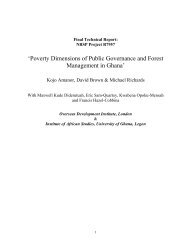The Gambian Tourist Value Chain and Prospects for Pro-Poor Tourism
The Gambian Tourist Value Chain and Prospects for Pro-Poor Tourism
The Gambian Tourist Value Chain and Prospects for Pro-Poor Tourism
Create successful ePaper yourself
Turn your PDF publications into a flip-book with our unique Google optimized e-Paper software.
<strong>Tourism</strong> in <strong>The</strong> Gambia: International ‘Best Practice’ in Poverty Reduction & <strong>Pro</strong>-<strong>Poor</strong> Growth Through <strong>Tourism</strong><br />
Draft Report (Friday 22 nd December 2006)<br />
This implies gross margins of about 60% <strong>for</strong> the hotel sector <strong>and</strong> provides a clear<br />
explanation <strong>for</strong> the extent of upgrading of existing hotel accommodation <strong>and</strong> the dem<strong>and</strong><br />
<strong>for</strong> new build accommodation. <strong>The</strong> fact that most hotels surveyed were debt-free may<br />
reflect their healthy viability – but it is also a reflection of the highly adverse local capital<br />
market with annual interest rates exceeding 30%. <strong>The</strong> lack of access to capital – clearly<br />
illustrated by wealthy individuals having to purchase hotels with cash – is obviously a<br />
constraint to development <strong>for</strong> the bulk of the population with few financial assets. This is in<br />
marked contrast with the evidence from Tunisia, where hoteliers are often highly geared to<br />
the point that viability is threatened by debt service costs.<br />
3.2 Dem<strong>and</strong><br />
On 24 th December 1965, an aircraft carrying 112 l<strong>and</strong>ed in <strong>The</strong> Gambia from Stockholm,<br />
Sweden. It was the first tourist charter to <strong>The</strong> Gambia <strong>and</strong> marked the beginning of an<br />
industry that is an important <strong>for</strong>ce in the economy 24 . In the late 1960s <strong>and</strong> early 1970s<br />
arrivals by sea <strong>and</strong> l<strong>and</strong> were a significant share of the total tourism. However, with the<br />
expansion of air travel from the early 1970s, an increasing proportion of total tourists<br />
arrived in <strong>The</strong> Gambia at the international airport.<br />
<strong>The</strong> Gambia is overwhelmingly a holiday destination with 99% of tourists stating ‘holiday’ as<br />
their purpose of visit in the official statistics – with ‘business’, ‘conference’ <strong>and</strong> ‘visiting<br />
friends <strong>and</strong> relations’ together making up the small number of other arrivals 25 . A detailed<br />
survey of 2,000 tourists at Banjul Airport in 2004, as part of the Master Plan process,<br />
confirmed the dominance of recreation as the purpose of visit – but suggested about 5% of<br />
guests were travelling <strong>for</strong> business or visiting friends or relations (VFR).<br />
Gambia is renown <strong>for</strong> its beaches <strong>and</strong> “winter sun” © Jonathan Mitchell<br />
A survey of 2,000 tourists in hotels in 2004 indicated that 99% used air transport to reach<br />
their destination, with road <strong>and</strong> sea arrivals together only constituting 1% of total arrivals.<br />
Not only are visitors dependent upon air travel, but the dominance of organised packages is<br />
clear. In the Airport survey, some 84% of all tourists are on package tours – a figure that<br />
rises to 87% when visitors travelling <strong>for</strong> business <strong>and</strong> VFR are excluded 26 .<br />
24 Ministry of <strong>Tourism</strong> & Culture (1995) National Policy <strong>for</strong> <strong>Tourism</strong> Development 1995 - 2000<br />
25 Gambia <strong>Tourism</strong> Authority Statistics Monthly tourist arrivals bey purpose of visit Jan – Dec 2004<br />
26 EMG (2005) <strong>The</strong> Gambia <strong>Tourism</strong> Development Master Plan Technical Report No.3 Visitor Survey at<br />
Banjul Airport<br />
20

















